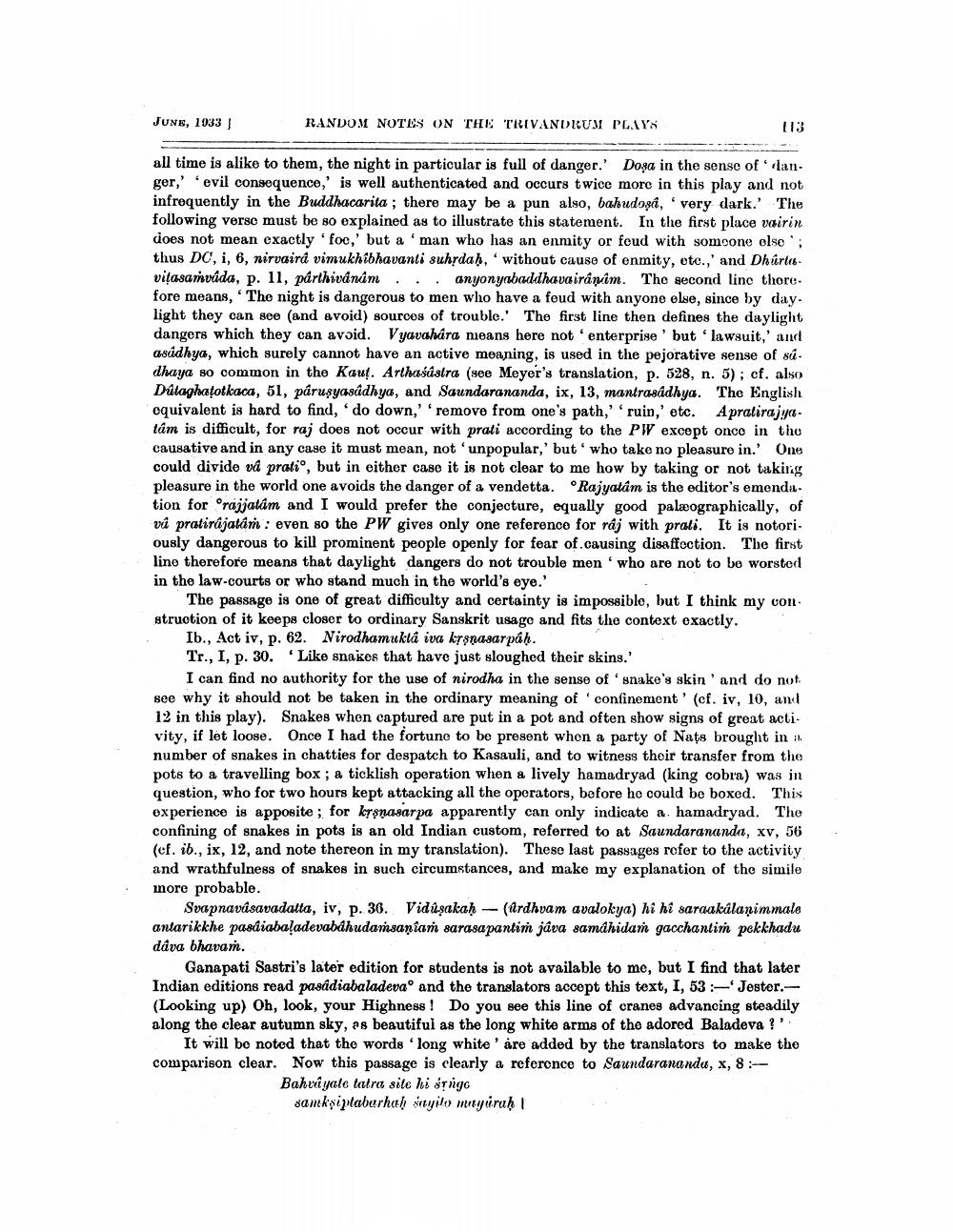________________
JUNE, 1933
RANDOM NOTES ON THE TRIVANDRUM PLAYS
113
all time is alike to them, the night in particular is full of danger.' Dosa in the sense of clan. ger,' evil consequence,' is well authenticated and occurs twice more in this play and not infrequently in the Buddhacarita ; there may be a pun also, bahudosá, very dark. The following verso must be so explained as to illustrate this statement. In the first place vairin cioes not mean exactly foc,' but a man who has an enmity or feud with someone else'; thus DC, i, 6, nirvairá vimukhibhavanti suhrdaḥ, without cause of enmity, etc.,' and Dhúrtesvitasanváda, p. 11, párthivdnin .anyonyabaddhavairanim. The second line thore. fore means, 'The night is dangerous to men who have a feud with anyone else, since by day. light they can see (and avoid) sources of trouble. The first line then defines the daylight dangers which they can avoid. Vyavahara means here not 'enterprise' but 'lawsuit,' and asádhya, which surely cannot have an active meaning, is used in the pejorative sense of sú. dhaya so common in the Kaut. Arthasastra (see Meyer's translation, p. 528, n. 5); cf. also Dúlaghatotkaca, 51, párusyasádhya, and Saundarananda, ix, 13, mantrasádhya. The English equivalent is hard to find,do down,' 'remove from one's path,' 'ruin,' etc. A pratirajya. tám is difficult, for raj does not occur with prati according to the PW except once in the causative and in any case it must mean, not 'unpopular,' but who take no pleasure in.' One could divide va pratio, but in either case it is not clear to me how by taking or not taking pleasure in the world one avoids the danger of a vendetta. Rajyatâm is the editor's emendation for Orajjatám and I would prefer the conjecture, equally good palæographically, of vú pratirájatáń: even so the PW gives only one reference for ráj with prali. It is notoriously dangerous to kill prominent people openly for fear of causing disaffoction. The first line therefore means that daylight dangers do not trouble men who are not to be worsted in the law-courts or who stand much in the world's eye.'
The passage is one of great difficulty and certainty is impossible, but I think my con struction of it keeps closer to ordinary Sanskrit usage and fits the context exactly.
Ib., Act iv, p. 62. Nirodhamukta iva kysnasarpáh. Tr., I, p. 30. Like snakes that have just sloughed their skins.'
I can find no authority for the use of nirodha in the sense of snake's skin and do not see why it should not be taken in the ordinary meaning of confinement' (cf. iv, 10, and 12 in this play). Snakes when captured are put in a pot and often show signs of great acti. vity, if let loose. Once I had the fortune to be present when a party of Nats brought in :) number of snakes in chatties for despatch to Kasauli, and to witness their transfer from the pots to a travelling box, a ticklish operation when a lively hamadryad (king cobra) was in question, who for two hours kept attacking all the operators, before he could be boxed. This experience is apposite; for kranasarpa apparently can only indicate a hamadryad. The confining of snakes in pots is an old Indian custom, referred to at Saundarananda, xv, 56 (cf. ib., ix, 12, and note thereon in my translation). These last passages refer to the activity and wrathfulness of snakes in such circumstances, and make my explanation of the simile more probable.
Svapnavísavadalta, iv, p. 36. Vid isakah - (Ardhvam avalokya) hi hi saraakalanimmalo antarikkhe pasdiabaladevabdhudansaniaṁ sarasapantis java samahidam gacchantim pekkhadu dáva bhavam.
Ganapati Sastri's later edition for students is not available to me, but I find that later Indian editions read pasadiabaladevao and the translators accept this text, I, 53 Jester.-- (Looking up) Oh, look, your Highness ! Do you see this line of cranes advancing steadily along the clear autumn sky, as beautiful as the long white arms of the adored Baladeva ?'.
It will be noted that the words 'long white' are added by the translators to make the comparison clear. Now this passage is clearly a reference to Saundarananda, x, 8:
Bahrayale tatra site li drugo
sanksiptabarhah sayilo mayuraḥ 1




